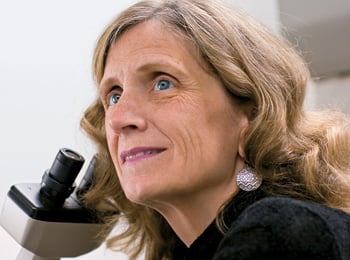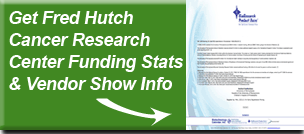 Dr. J. Lee Nelson (right) has been studying the fascinating phenomenon of microchimerism in the context of autoimmune disorders ever since she joined the Fred Hutchinson Cancer Research Center faculty in 1986. Microchimerism refers to the presence of two distinct sets of cells in one individual and is surprisingly common as a result of cell exchange between mother and child during pregnancy. The numbers of these outside cells is typically small, but Dr. Nelson's research has implicated them in various autoimmune responses, both positive and negative.
Dr. J. Lee Nelson (right) has been studying the fascinating phenomenon of microchimerism in the context of autoimmune disorders ever since she joined the Fred Hutchinson Cancer Research Center faculty in 1986. Microchimerism refers to the presence of two distinct sets of cells in one individual and is surprisingly common as a result of cell exchange between mother and child during pregnancy. The numbers of these outside cells is typically small, but Dr. Nelson's research has implicated them in various autoimmune responses, both positive and negative.
Most recently, the Nelson Lab published a study in which male cells were found to have crossed the blood-brain barrier and were present in the brains of women, likely as a result of their having given birth to a son, even many years past. F. N. Chan, PhD (previously of the Nelson Lab, now in Alberta) was the lead author in the male cell brain study, which got its data through autopsying 59 women who died between the ages of 32-101. Since the women's childbirth history was not known in many cases, the exact correspondence between birthing boys and male brain cells remains unclear. Nevertheless, the presence of male cells was remarkably common, and they had in fact crossed the blood-brain barrier, which it was not thought they could do. Dr. Nelson is one of the foremost authorities in the world on microchimerism, and her lab studies its relationship to autoimmune disease, reproduction, cancer, infectious disease, and transplantation.
Rheumatoid arthritis (RA) is an autoimmune disease that often causes intense pain and is extremely difficult to treat successfully. Yet pregnant women who have previously suffered from RA sometimes find their symptoms miraculously vanish when they are carrying a child. Nelson was intrigued the first time she encountered this phenomenon. Her subsequent research led her to postulate that fetal cells were being passed to the mother, that they were stem cells, and that the stem cells were responsible for diminishing the effects of RA.
In related studies, Nelson and her lab researchers have identified distinct maternal cells in children, even though the children may have reached adulthood. Maternal cells found in the pancreas successfully producing insulin suggest that those cells might be useful to regenerate diseased organs in diabetic children. In cancer research related to microchimerism, some cancers seem to be less common and others more in the presence of the secondary cells. There is more work to be done in this curious area of investigation, but thanks to Dr. Nelson and her colleagues and students, a new field of inquiry is on the map and shows promise for future therapies and a more thorough understanding of cell sharing and health.
Dr. Nelson currently has two NIH-funded projects underway. Fred Hutchinson Cancer Research Center has almost $223M in 2012 NIH funding for 265 projects.
Meet with researchers at Fred Hutch when Biotechnology Calendar Inc. holds its 7th Annual BioResearch Product Faire™ event at the Center in Seattle next week on October 24, 2012, then again next year on October 23, 2013. For information on exhibiting and a free funding report, click the button:

To register to attend the upcoming event, click here.
Biotechnology Calendar, Inc. is a full-service event marketing and planning company producing on-campus life science research tradeshows nationwide for going on 19 years. We plan and promote each event to bring the best products and services to the best research campuses across the country. Life science researchers, purchasing agents, and lab managers are actively invited to attend to see the latest products and equipment and discuss their laboratory tool and service needs. See our just-released nationwide show schedule for 2013.

